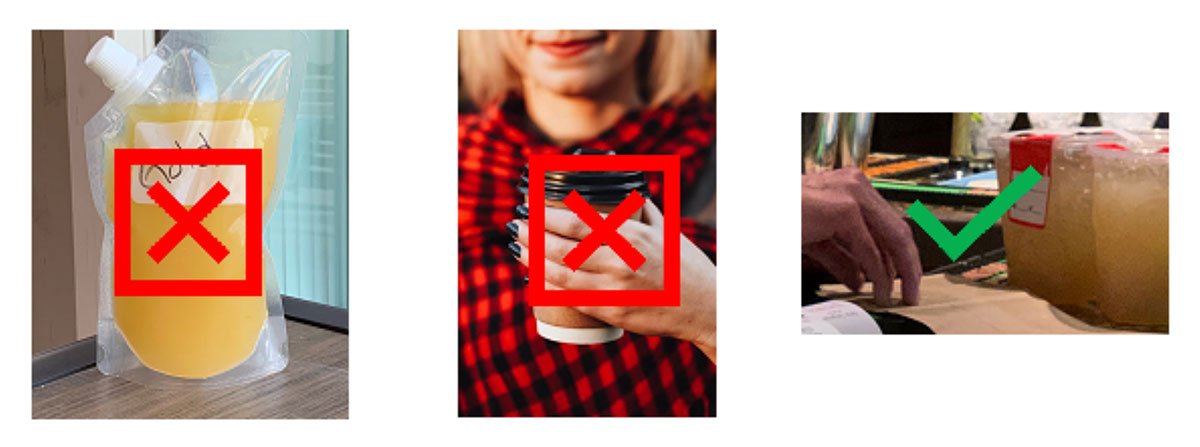Curbside to Go
“Curbside to go” – The general rule is that all licensees that possess a Retail by the Drink (RBD) license are prohibited from selling drinks to go. Any open drink sold on the premise is to be consumed on the licensed premise. Under limited circumstances the law provides for “curbside to go drinks” for certain establishments. The main guidelines are as follows:
- The patron must purchase a meal simultaneous with the alcoholic beverage purchase
- The meal must be prepared on-premises
- There can only be 2 drinks sold per each meal purchased. For example, 1 meal purchased = 2 drinks can be slod, 2 meals purchased = 4 drinks can be sold
- The size of the to go container cannot exceed 128 ounces
- The ‘to-go” container must be rigid, durable, leakproof, and sealable
- Containers with sipping holes or opening for straws are prohibited
- The establishment must provide the consumer with a dated receipt for the meal and the drinks
- The container must be placed in a one time-use, tamperproof, transparent bag that is securely sealed or the container is sealed with tamperproof tape
- The container shall be labeled with the name and address of the business that sold the “to go” drink
- The “to go” drink must also contain the following wording “This Beverage Contains Alcohol”
Curbside to Go Examples

Third-Party Delivery and Curbside to Go
While the law allows for home delivery of alcoholic beverages there are some guidelines your business must follow. For instance, your delivery driver must be 21-years of age or older and they are required to verify the age of the recipient. Dropping it off at the door without seeing the recipient and verifying their age places your liquor license in jeopardy. The delivery driver should ask for proper form of identification and employ the same techniques for verifying age just as they would if the patron came into your brick-and-mortar location.
Many patrons have started using delivery companies such as “DoorDash” and “Grubhub” to place their orders for food and liquor. Remember that it is your responsibility to verify age of the end consumer who will receive the alcohol. Just because the delivery driver who picks up the order from your establishment is of age does not release you from your obligation to verify the age of the recipient. Consequently, you may as a matter of company policy prohibit the sale of alcoholic beverages via home delivery systems. If you do choose to allow the use of third-party delivery companies for alcohol you should only contract with reputable companies who agree to have their drivers verify the age of the recipient.
RSMo 311.202
311.202. Sale of retailer-packaged alcoholic beverages to customers in containers for off-premises consumption, when — requirements. — 1. Notwithstanding any provision of law to the contrary, any person who is licensed to sell intoxicating liquor at retail by the drink for on-premises consumption may sell retailer-packaged alcoholic beverages to customers in containers, filled on such premises by any employee of the retailer who is twenty-one years of age or older, for off-premises consumption if all the following requirements are met:
(1) The container of the alcoholic beverage is rigid, durable, leakproof, sealable, and designed to prevent consumption without removal of the tamperproof cap or seal. A sealable container does not include a container with a lid with sipping holes or openings for straws.
(2) The contents of each container do not exceed one hundred twenty-eight ounces.
(3) The patron orders and purchases a meal from the licensee simultaneous with the alcoholic beverage purchase. For purposes of this subdivision, a "meal" is defined as food that has been prepared on-premises.
(4) The number of alcoholic beverages sold under this section by a licensee for off-premises consumption is limited to twice the number of meal servings sold by the licensee for off-premises consumption.
(5) The licensee provides the patron with a dated receipt or an electronic record for the meal and alcohol beverages; and
(6) The container is either:
(a) Placed in a one-time-use, tamperproof, transparent bag that is securely sealed; or
(b) The container opening is sealed with tamperproof tape.
For purposes of this subdivision, "tamperproof" means that a lid, cap, or seal visibly demonstrates when a bag or container has been opened.
2. Containers that are filled under subsection 1 of this section shall be affixed with a label or a tag that contains the name and address of the business that filled the container, in type not smaller than three millimeters in height and not more than twelve characters per inch, and states, "THIS BEVERAGE CONTAINS ALCOHOL.".
3. The filling of a container under this section shall be in compliance with Section 3-304.17(C) of the 2009 Food and Drug Administration Food Code.
4. No provision of law, or rule or regulation of the division of alcohol and tobacco control, shall be interpreted to allow any wholesaler, distributor, or manufacturer of intoxicating liquor to furnish containers that are filled under subsection 1 of this section to any person who is licensed to sell intoxicating liquor at retail.